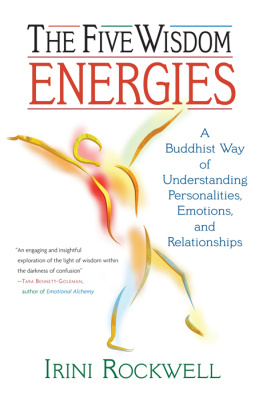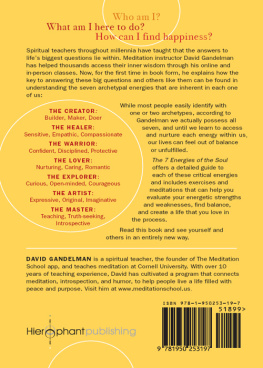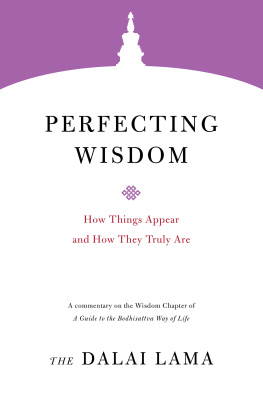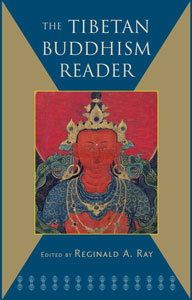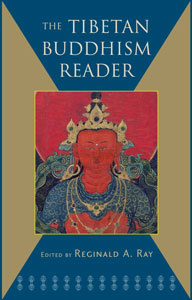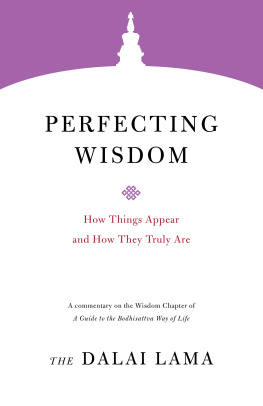A wise tool for self-understanding, this book uses the insights of Buddhist psychology to show how basic energy patterns present themselves as different personality types, and how understanding these energies can help us to integrate spiritual practice into daily life.
Helen Palmer, author of The Enneagram
Rockwell has created a wonderful guide for understanding ourselves in relationship to others. This book offers a deep appreciation of the energies that move in each of us.
Margaret Wheatley, author of Leadership and the New Science and Turning to One Another
Direct and reader-friendly, this book reflects the teachings on the five buddha families like a bright jewel.
Joan Halifax Roshi, Head Teacher, Upaya Zen Center
ABOUT THE BOOK
This book invites us to celebrate our strengths and work with our weaknesses by learning to identify and utilize five basic personal styles or energies. Written in a playful and accessible way, this is the first general-audience book on a Tibetan Buddhist system known as the five buddha familiesan insightful way of understanding human behavior and promoting personal growth.
Each of the five wisdom energies is associated with particular ways of perceiving and interacting with the world and also with particular colors, elements, senses, seasons, and times of day. With easy, fun, and engaging exercises and stories, Irini Rockwell shows us how to identify which energies are active in our lives, and how we can work with them in any situation to improve self-awareness, communication, and creative expression.
According to the Tibetan Buddhist tradition, each of us has one or two dominant energies, but these can shift and change over time, and we can manifest different energies in different areas of our lives. Each of the five energies has its unique wisdom, but also its neurotic tendencies. By learning to recognize which energies we possessand which are present in those around uswe can learn to relax and appreciate our natural traits and those of others, and we can move away from our neuroses toward the wisdom-aspects of our character.
IRINI ROCKWELL is a senior teacher in the Buddhist lineage of Tibetan meditation master Chgyam Trungpa. She holds a masters in contemplative psychotherapy and is the director of the Five Wisdoms Institute, an organization offering training programs to enhance self-awareness, communication, and effectiveness. For more information, visit www.fivewisdomsinstitute.com.
Sign up to learn more about our books and receive special offers from Shambhala Publications.

Or visit us online to sign up at shambhala.com/eshambhala.
THE FIVE WISDOM ENERGIES
A Buddhist Way of Understanding Personalities, Emotions, and Relationships
IRINI ROCKWELL

SHAMBHALA
Boston & London
2012
Shambhala Publications, Inc.
Horticultural Hall
300 Massachusetts Avenue
Boston, Massachusetts 02115
www.shambhala.com
2002 by Irini Rockwell
Cover art & design by Jim Zaccaria
All rights reserved. No part of this book may be reproduced in any form or by any means, electronic or mechanical, including photocopying, recording, or by any information storage and retrieval system, without permission in writing from the publisher.
Library of Congress Cataloging-in-Publication Data
Rockwell, Irini Nadel.
The five wisdom energies: a Buddhist way of understanding personalities, emotions, and relationships/Irini Rockwell.1st ed.
p. cm.
Includes bibliographical references and index.
eISBN 978-0-8348-2408-9
ISBN 978-1-57062-451-3
1. Spiritual lifeBuddhism. 2. BuddhismChinaTibet. I. Title.
BQ7805.R63 2002
294.3422dc21 2001049555
TO
CHGYAM TRUNGPA RINPOCHE
CONTENTS
This book weaves together my work with contemplative approaches to working in psychotherapy, education, organizations, and the arts. It would never have come into being without the help of a great many people in many walks of life.
First, I would like to express my tremendous appreciation for Chgyam Trungpa Rinpoche, who introduced me to a world where I can simultaneously embrace who I am and let go of who I am. His teachings on meditation, psychology, the arts, and simply becoming a full human being have been the primary inspiration for my life and this book. Trungpa Rinpoche always encouraged us to experiment in working with the buddha-family energies. He listened to peoples suggestions and trusted their experiences and insights. I always felt he was giving me an open, fertile field in which to play. For this I am deeply grateful. My heartfelt thanks also go to his son Sakyong Mipham Rinpoche, who has been so immensely supportive and encouraging of the Maitri work in general and this book in particular. In addition, over the last ten years, the teachings of Khenpo Tsultrim Gyamtso have been a powerful force in my life. His spontaneous presence, profound teachings, and playful energy give me great inspiration and joy.
I would also like to thank my family. My husband, John Rockwell, posted slogans like Never give up on maitri, Love to the maitri lady, and Drive all maitri into oneself at just the right times to give me a boost of warm, playful encouragement. I am thankful to my children, who, in so fully being who they are, have inspired me. My son, Julian, with whom I have talked about the energies all his life, continually inspires me with how he uses his understanding of the energies, whether in teaching kids at risk, in his intimate relationships, or more recently with organizational development work. I love the directness with which my daughter, Chandra, reveals herself and explores her world through the energies. Most touching has been my fathers response to reading some of this manuscript. It precipitated a closeness between us that we had never before experienced so fully. At age eighty-two he was so inspired that he presented some of these ideas to a Quaker forum to which he belongs.
To the many others who inspired me, influenced me, and supported me as the book unfolded, I express much appreciation. As the person who was the initial catalyst for this book, I would like to thank Martha Bonzi, who put it into my head that I could do this. I would like to acknowledge the many teachers of Shambhala Buddhism and especially of five wisdom energies work, the participants in programs, my students, my clients, and members of the Maitri Council International. They teach me continually and have helped me evolve my personal understanding over the past twenty-five years. In particular I have explored this work at many levels and have formed deep friendships and close working relationships with many teachers of the energies. I would like to thank Marvin Casper, Ed Podvoll, Jeff Fortuna, Karen Kissel Wegela, Susan Skjei, Judy Lief, Pema Chdrn, Allyn Lyon, John Rockwell, Claudette Rodrigue, Melissa Moore, Paul Cashman, and Jeremy Hayward for sharing their insights and experiences with me. Many thanks to Claudette for contributions to the activities for the energies.
I want to acknowledge with much appreciation those individuals and organizations that have been financially supportive throughout the years it has taken to write the book: Ernst Leibhardt, Nancy Edison, and the Nalanda Individual Assistance Trust.
Most important, I wish to thank Emily Hilburn Sell, my editor at Shambhala Publications, who provided the essential nurturing as well as critical feedback that brought this material to the world in written form. Without her I could not have endured the laborious process of translating this work into contemporary language for general understanding. It has been a special pleasure to work with the Shambhala Publications staff: Jonathan Green, Emily Bower, Susan Cohan, and Peter Bermudes. Their expertise has been an inspiration. This process was much aided by the work of several others who assisted with editing: Holly Hammond, to whom I am indebted for clarifying the material with a major line editing; Laura Perrault, whose infectious enthusiasm to work on the book came at just the right moment; my ex-husband Ernie Nadel, who gave some very helpful editing suggestions; and finally my son, Julian, who added his own insights and flavor in several parts as icing on the cake.
Next page
